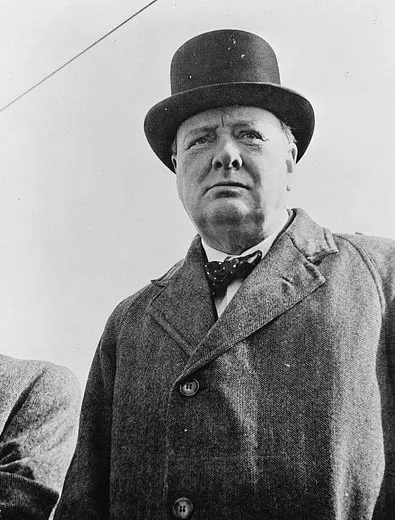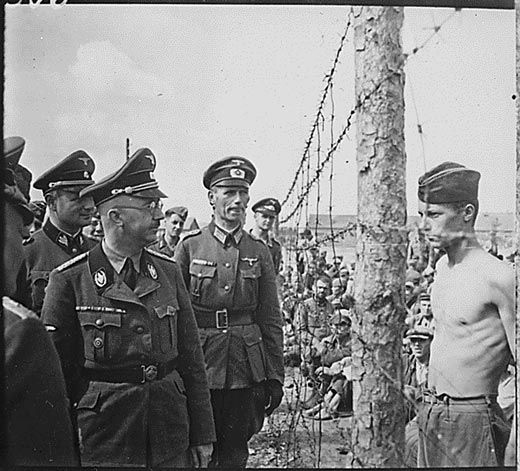Rewriting History in Great Britain
Recently uncovered documents in the British archives reveal dark secrets from World War II. One problem: they are forgeries
/https://tf-cmsv2-smithsonianmag-media.s3.amazonaws.com/filer/archive_631.jpg)
Nothing is as central to the way the British view themselves as the telling and retelling of their gallant fight against the Nazis. Perhaps the colossal figure of Winston Churchill is taken for granted now, his boozy final years remembered with an indulgent chuckle, his elitist views and nostalgia for Empire taken as a slight embarrassment. But no one pokes fun at the underlying tale: the bull's-eye accuracy of his ignored early warnings about Hitler's intent, the real-time impact of his oratory once he became prime minister, the nation's banding together during the Blitz, the bravery of the pilots who fought the Battle of Britain and the core belief that Britain's stout heart turned the tide against fascism for decades to come.
So it was a something of a shock when a handful of books over the last decade implicated Churchill's government in the cold-blooded killing of the head of the SS, Heinrich Himmler—who was long believed to have killed himself with a hidden cyanide capsule after the British captured him—and showed that Churchill's government had held secret peace negotiations with the Nazis in betrayal of its alliance with the Americans and the Russians.
"That was one of the key issues between the Allies during the war," says Sir Max Hastings, a historian specializing in the history of World War II. "There was profound suspicion on all sides that one party or another might seek unilaterally to procure a peace with Hitler. Right into 1942, the British and Americans were extremely nervous that Russia might seek to make a deal, and the Russians were absolutely paranoid about this throughout the war."
In reporting the plot against Himmler, the books relied on newly uncovered documents at Britain's National Archives; the documents suggested that Himmler had to be killed to keep him out of the hands of American interrogators and off the witness stand in any war crimes prosecutions. The assertions, if true, would require the history of the war be rewritten.
But no revision is necessary; the documents are forgeries.
Any relief among historians, however, has been tempered by outrage at how the episode has progressed: British investigators identified a likely forger—then declined to prosecute him. It was "not in the public's interest," because of the suspect's ill health, the Crown Prosecution Service said in May 2008. But historians and others are still asking: where does the public's interest lie?
The forgeries were uncovered by Ben Fenton, a British journalist with long experience working with original documents from that era. He believed the revisionist books based on them were perverting history. He also had what he called a "patriotic, almost jingoistic" hope that British officials had not carried out the deeds described in the suspect documents.
"Murdering senior members of a foreign regime was not what you expected at that stage in the war," he says of the idea of government-approved assassination. "It was my hope that the British hadn't behaved like that. It would have meant Britain was not much better than the Nazis."
By the time Fenton went to the beautifully landscaped National Archives complex near the Royal Botanical Gardens of Kew to study the files in June 2005, he had already gotten an e-mail from a colleague questioning the documents' authenticity. As soon as he saw them for himself, Fenton felt in his gut that they were fakes.
It wasn't any one thing. There were pencil lines beneath some of the signatures, indicating that someone may have been trying to trace the signature from an original.
Some word choices—"devastating," for example—were inconsistent with period usage. Some diplomatic titles were incorrect—highly unusual in the precise world of British official parlance. And some assertions—notably that the government had killed Himmler—were so sensitive they would not have been written down.
"I didn't think it was a slam dunk," Fenton says. But he was sufficiently suspicious to take his concerns to David Thomas, then the National Archives' director of government and technologies.
Unbeknownst to Fenton, a German scholar had already alerted Thomas to the possibility that the documents were phony, but the scholar had provided little evidence at that time for Thomas to feel it necessary to launch an investigation. After Fenton contacted Thomas, however, the director agreed to let an outside forensics expert scrutinize the originals. As soon as the specialist concluded that the documents were fakes, Scotland Yard was called in.
Ultimately experts would identify 29 forged documents that are cited in three books by historian Martin Allen. Meanwhile, Scotland Yard moved slowly, building its case well out of the public eye, until May of this year, when Fenton reported in the Financial Times Weekend Magazine that police had identified a suspect.
But although the Crown Prosecution Service said there was "sufficient evidence to bring a prosecution for forgery and criminal damage," the Crown had decided not to press charges after the "reviewing lawyer carefully considered medical reports and all relevant public interest factors."
The matter was supposed to end there, but eight leading scholars sent a letter to the editor of the Financial Times demanding that an official report on the scandal be compiled and made public.
Sir Max Hastings helped lead the charge. He says he wants a criminal prosecution—or at least a public accounting—not for vengeance against the perpetrator but to deter anyone else from trying to plant fakes in the archives, "discover" them, and then cash in by writing a book based on them.
"It would be catastrophic if writers thought they could get away with a stunt like this by fabricating material," he said. "The Holy Grail for every writer of a new book is to discover some key piece of new information. Writers are always striving to try to discover this magic key to give them the terrific sales boost that comes with finding something new. If people think they can make a bundle by fabricating material, they will do it."
Andrew Roberts, author of Hitler & Churchill (which does not rely on the forgeries), says the planting of documents represents an ominous new tactic.
"We've never come across something that was entirely invented after the period itself," he says. "A lot has been invented at the time, and we've been dealing with forgeries for ages, but right now in the 21st century you don't expect people to make things up and place them in the National Archives as a way of selling a book. It's creating false memory syndromes about a very important part of our national story."
Antony Beevor, author of Berlin, The Downfall 1945 and other best-selling accounts of the era, worries that whoever planted the documents is fueling conspiracy theorists and other historical revisionists.
"Truth is being undermined," he says. "One can see the possibility of Holocaust denial groups being able to turn this around, saying, well, if there are fake documents in the National Archives there could be fake documents having to do with the Holocaust. All these theories are mixing together and feeding off each other."
While the prosecutors' press release did not name the suspect, Britain's Solicitor-General, Vera Baird, responded to a question from a member of Parliament by saying that The Crown Prosecution Service had found "sufficient evidence to provide a realistic prospect of conviction against Mr. [Martin] Allen for a number of criminal offenses, but . . . there were a number of public interest factors against a prosecution, which outweighed those in favor."
Allen has not been charged with any wrongdoing. His lawyer, Patrick Butler, says Allen had no part in preparing or planting the forgeries and believed that they were entirely genuine when he quoted them in his books.
"If they are forgeries, he would love to know who did it and when and why," says Butler, who says Allen is "in very poor health" with an unspecified illness. The lawyer also criticizes the National Archives management for letting the documents be removed for scrutiny by outside experts. This compromised the chain of custody, he says, and raised the possibility that outsiders might have tampered with the papers.
The decision not to prosecute leaves Allen in limbo, with his reputation under attack but without a forum in which to defend himself.
"I can't comment on the Crown Prosecution Service decision because they are the prosecuting authority," says David Thomas, now the National Archives's chief information officer, "but I think that from Allen's point of view and from our point of view, it's a shame there never was a trial," he says.
"Then at least there would have been some certainty about it."


